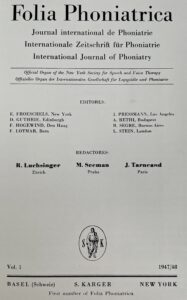Published since 1949, Folia Phoniatrica et Logopaedica provides a forum for international research on the anatomy, physiology, and pathology of structures of the speech, language, swallowing, and hearing mechanisms. Original papers published in this journal report new findings on basic function, assessment, management, and test development in communication sciences and disorders, as well as experiments designed to test specific theories of speech, language, swallowing, and hearing function.
IALP individual members, as well as members of Affiliate Societies have the benefit of free access to Folia Phoniatrica et Logopaedica dating back to 1949, Volume 1.
In addition to free online access to all journal issues, IALP’s members and Affiliated Societies also have free access to selected articles from other related journals in the Karger portfolio. This collection, curated from journals such as Gerontology, ORL, and Audiology and Neurotology, contains articles on such topics as ASD, cochlear implants, and age-related speech issues.
Karger produces a series of publications known as Fast Facts. These condensed publications address knowledge gaps in healthcare enabling a dialogue between healthcare professionals, patients and other stakeholders from the healthcare ecosystem. They provide premium content to improve practice and strive to promote health through communication with a global network of healthcare professionals and patients.
Members of IALP have contributed to the development of Fast Facts with the most current publications listed below:
Fast Facts: Neurogenic Dysphagia
Fast Facts: Dementia and Augmentative and Alternative Communication
Fast Facts: Early Hearing Detection and Intervention

Folia Phoniatrica was founded in 1947, originally as an outlet for European professionals working in the fields of phoniatrics and logopedics. Following WWII, many of the pre-war specialized journals had ceased publication, so in effect by the end of the war no single specialized journal in the field was available to researchers and clinicians. The journal was founded by Richard Luchsinger (Zürich), Miloslav Seeman (Prague), and Jean Tarneaud (Paris). On initiative of the IALP, the name of the journal was modified to Folia Phoniatrica et Logopaedica in 1994, but the Latin language was maintained. Folia Phoniatrica et Logopaedicahas been in existence for approximately 75 years and serves as one of the leading international journals in the field of communication sciences and disorders. (Source: Shutte, H. & Svec, J. 60 years of Folia – Review and comparison of two general journal in our field. Folia Phoniatr Logop 2008;60:273-278).
© 2024 IALP, All rights reserved | Master Privacy Policy | Cookie Policy
An individual enrolled for part- or full-time study for preregistration, undergraduate or postgraduate studies directly related to the field of human communication disorders and sciences at a formal education institution. Students must provide official evidence of enrolment at the time of joining the Association and/or registering for a congress/composium.
On behalf of the IALP I would like to thank you for considering membership in our global organisation of professionals.